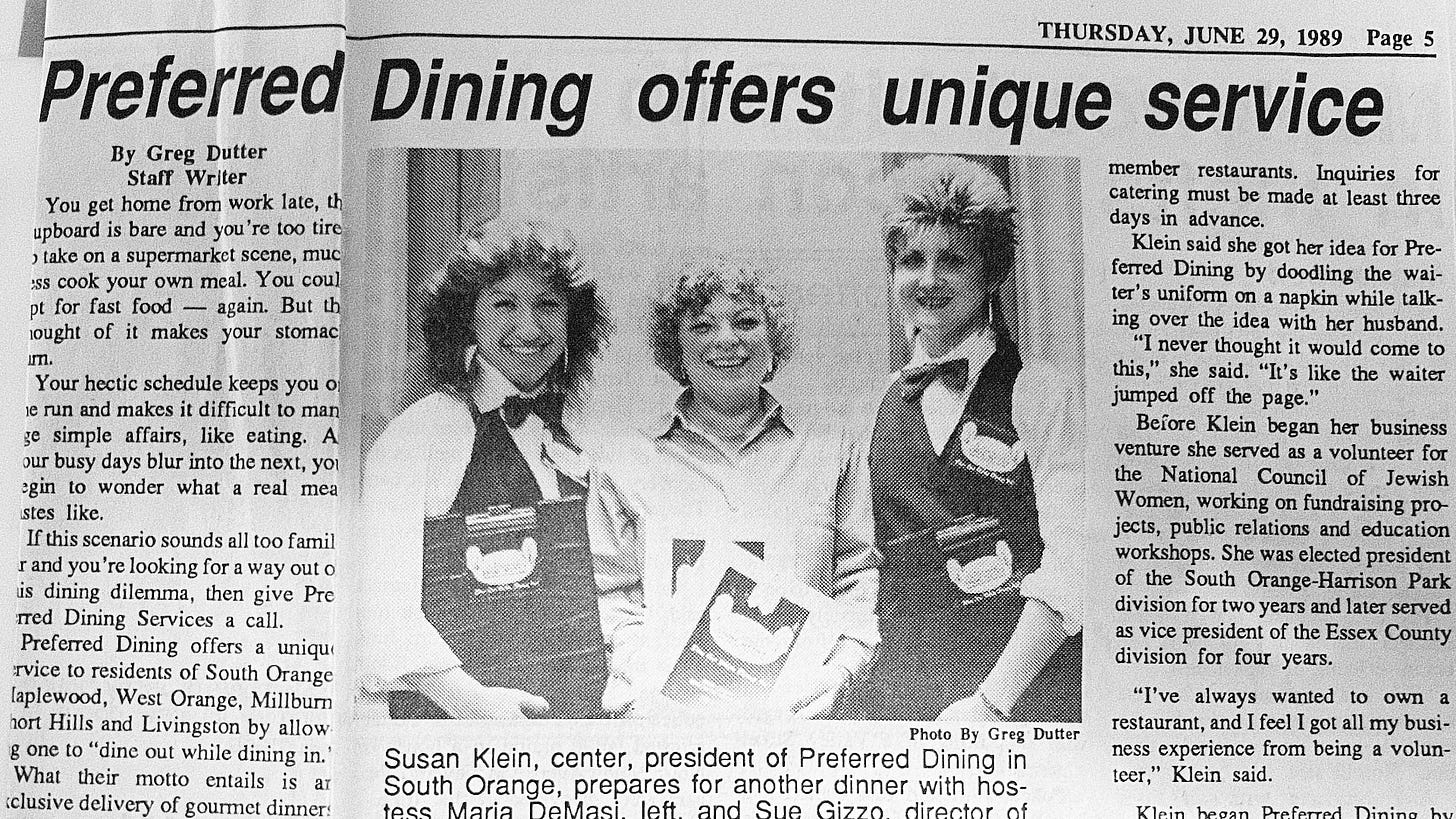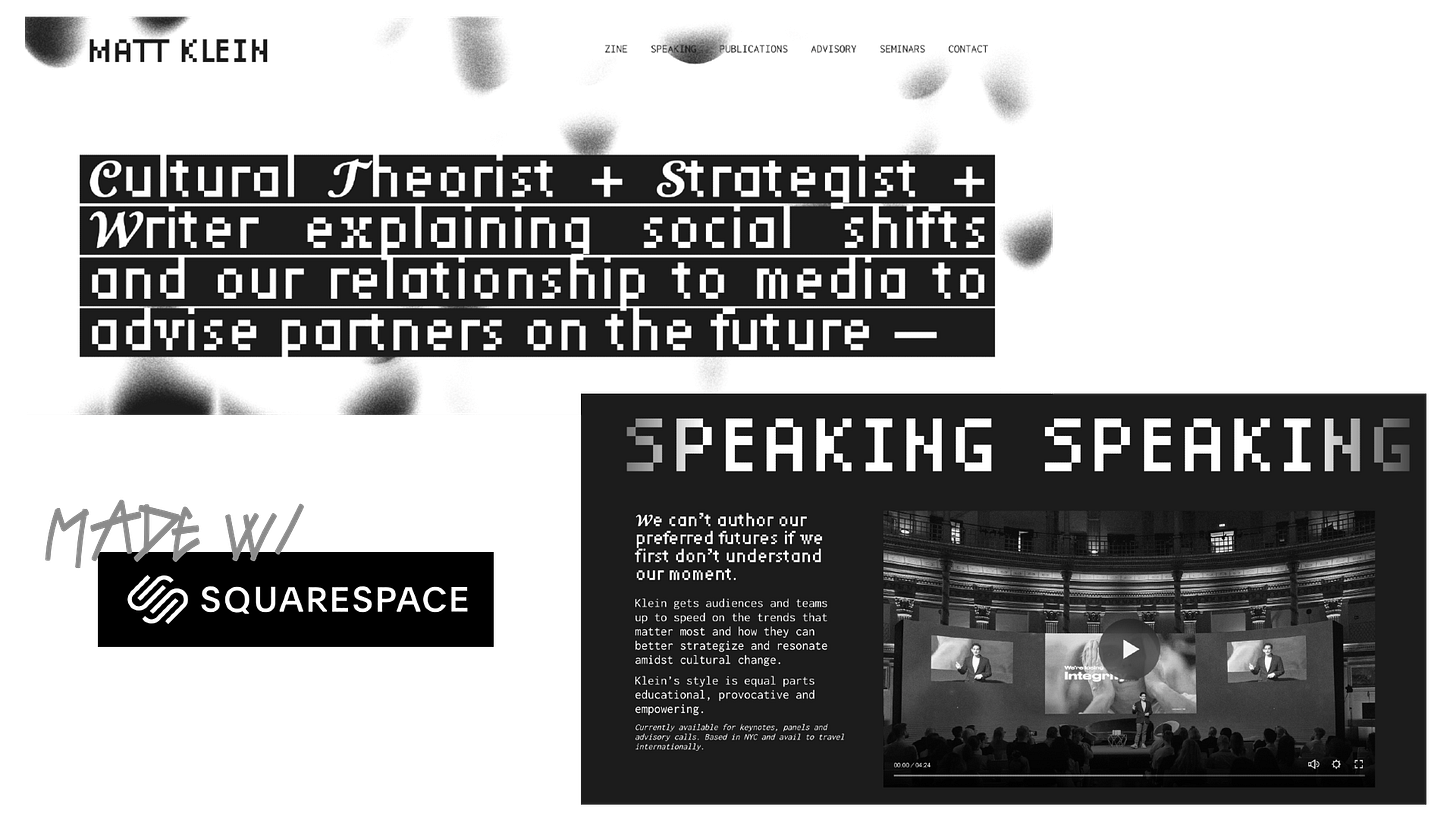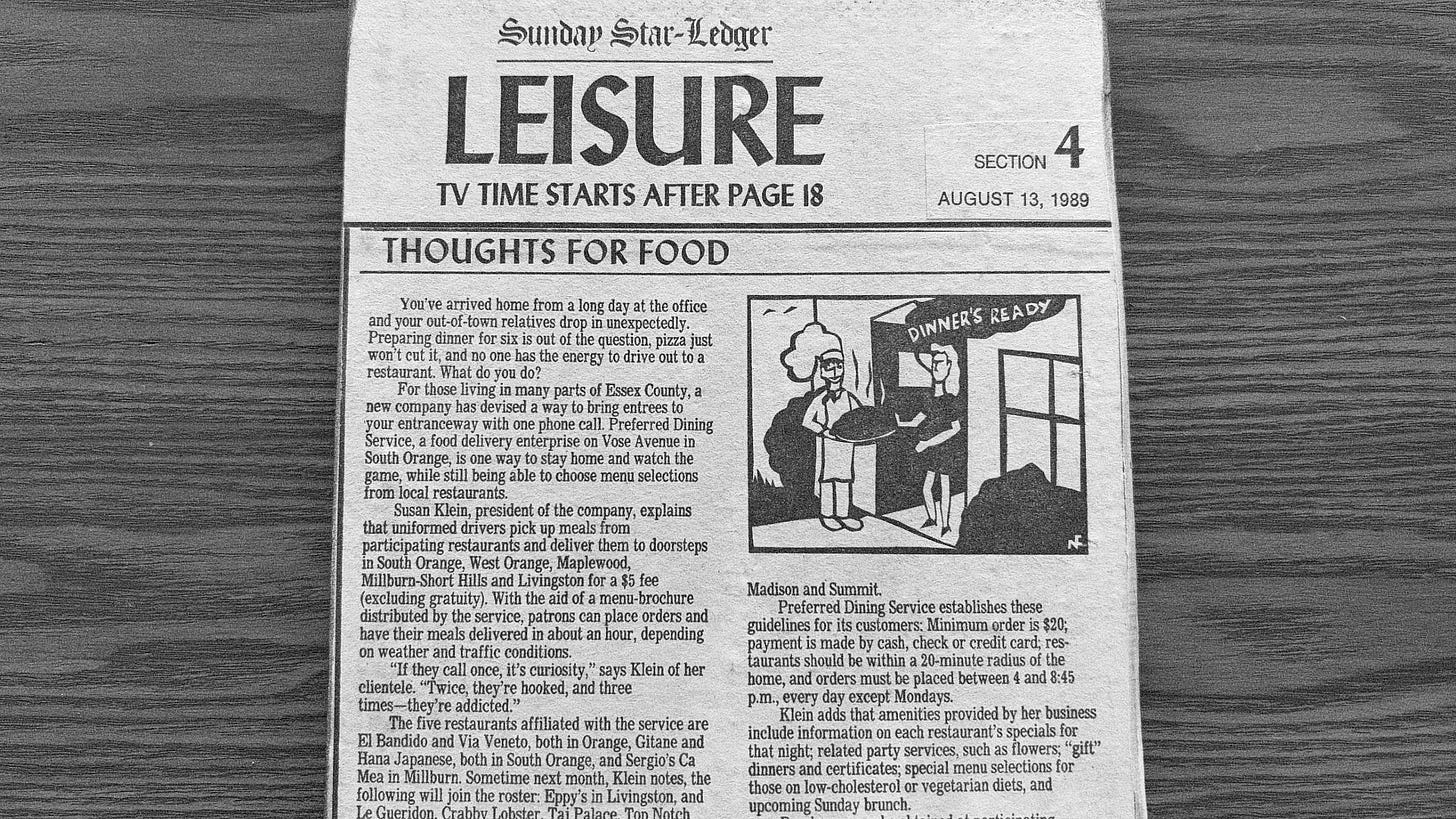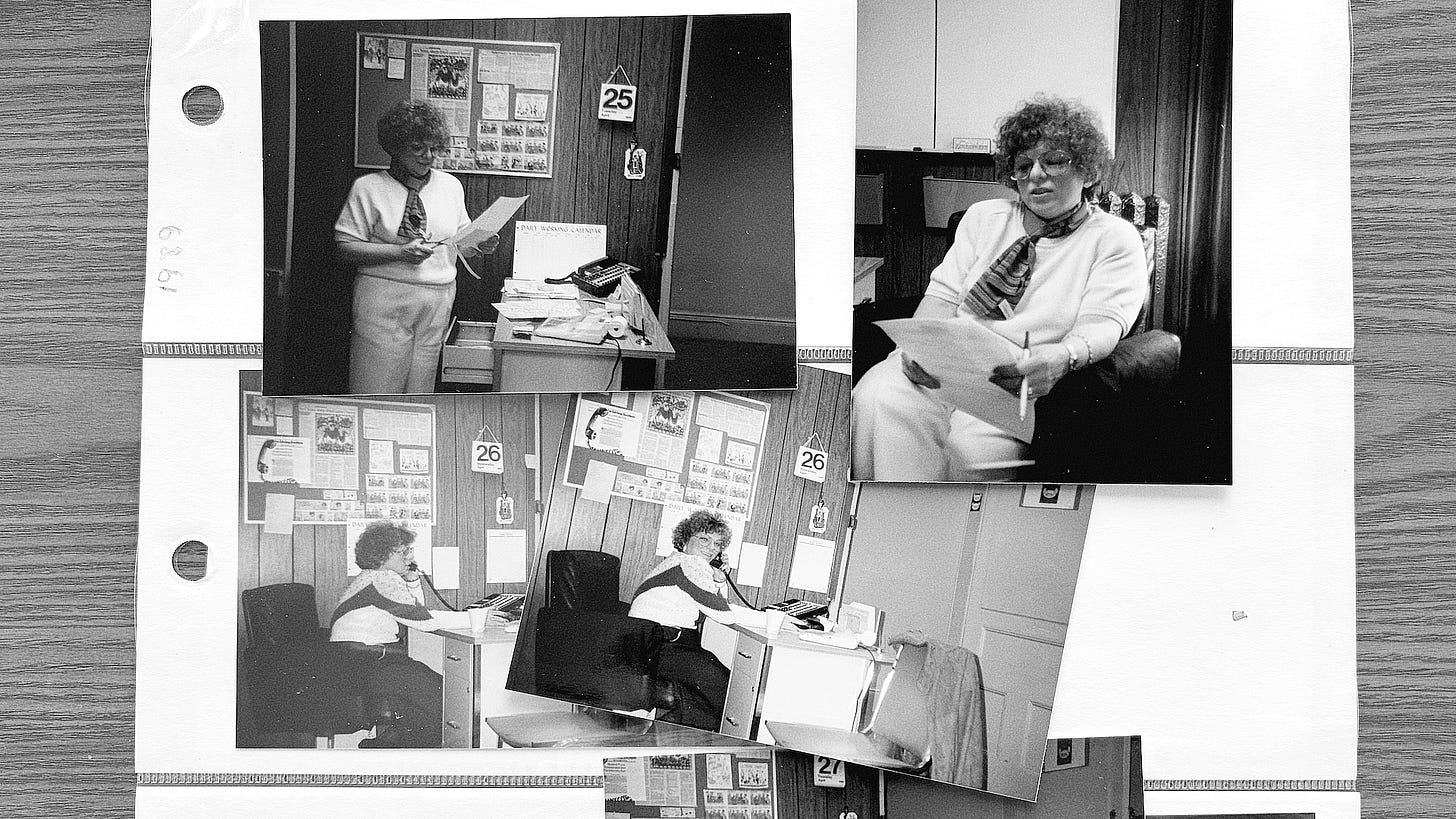Lessons From My Grandma Inventing DoorDash
How Reality & Product Culture Fit Works
Preface:
In a series of essays in partnership with Squarespace, we’ll make sense of our relationship with reality and how culture is constructed.
Making it real is now an act of rebellion, a middle finger to the paralysis brought on by consensus collapse. The line between fact and fantasy continues to blur, but when reality is this negotiable, the soil for preferred futures is fertile. You can just do things. What’s the future you want to see? Making reclaims agency amidst lost meaning. So, don’t escape this reality — design the one you want. We desperately need your alternatives.
Literally make anything real with -10% off any site. I’ve been using Squarespace for 15 years, and cannot recommend them enough.
Claim your name and build your world. With built-in domain services, secure your corner of the web then bring your vision to life with the award-winning templates and simple drag-and-drop editing. A preferred future starts with a URL. No design experience required. Just the will to make something real.
The Launch
In 1989 Susan Klein launched Preferred Dining Service. She was profiled by local newspapers. No one ever heard of such an idea.
Customers would call her office with their food order. Preferred Dining Service would then place that order with a restaurant, pick it up and then bring it to the customer.
Suddenly, restaurants in New Jersey could increase their business without having to accommodate more people in their dining room. And suddenly, residents in New Jersey could eat from their favorite restaurants without ever putting on pants.
My grandma helped usher in what we now call “food delivery.”
Pizzerias and Chinese restaurants were only just introducing us to delivery in the 60s and 70s, but they were operating logistics themselves, independently. Other cuisine delivery wasn’t on anyone’s radar until the 80s and 90s... and a third party bundling all local restaurants together? Unheard of.
Preferred Dining’s delivery men and women dressed as waitstaff and hand delivered fresh restaurant food to late working businessmen and busy housewives in New Jersey... two and a half decades before DoorDash did in Palo Alto.
But as prescient as my grandma is, the Kleins aren’t billionaires.
Preferred Dining Service delivered over 5,000 meals before shutting down in less than two years.
Is it a Fit?
Preferred Dining reveals the importance of Product Market Fit.
An idea is just that — an idea. Unless the market demand and the technical environment are ready for whatever you’ve got... better luck later.
Preferred Dining launched when there were no smartphones, no digital payment systems, no mobile GPS for drivers, and no online restaurant menus or reviews to scroll through.
These conditions prevented Preferred Dining from ever really taking off.
But while Product Market Fit makes or breaks upstarts, there’s another more nuanced condition: Product Culture Fit.
If Product Market Fit is about existing infrastructure ensuring blast off, Product Culture Fit signals that culture is ready for new meanings, symbols, and narratives. Does this idea align with social or individual values? Does this story make sense? Is this behavior socially acceptable?
Preferred Dining exploded... but to an extent. The pitch was at odds with inconducive cultural narratives at the time. Outsourcing a home meal to a restaurant could make one feel lazy. Such uncommon indulgence triggered class anxiety. And dining out was a public performance and opportunity for socialization. At the time, ordering in could feel like a rip off. Same food prices but without the social proof. Turns out over-worked blue-collar workers were Preferred Dining Services’ core customer base — they couldn’t care less about being seen out.
But the most critical cultural narrative that Preferred Dining ran up against was “scale.”
“The margins were too small.” My grandma still remembers,
“The only way this idea could have made sense financially was if we had a bajillion consumers, a bajillion restaurants and a bajillion delivery workers.”
That... and if she was willing to take a larger cut herself and rip off her delivery workforce. Some nights when the phones were lighting up, my grandma hopped in the car to deliver meals herself.
Define Success
In light of Product Culture Fit, what actually changed socially that my grandma failed and DoorDash “succeeded?”
Well, DoorDash ignored the limitations of scale and ignored shit margins. For over a decade, DoorDash ran at staggering losses, only finally reaching profitability in 2024 — 11 full years after it was founded. It spent $5.9B in venture funding to condition us that 24/7 delivery was possible. DoorDash alone spent over $50M of roughly $200M, lobbying for Prop 22 in California, reshaping labor law to avoid classifying delivery workers as employees.
DoorDash didn’t wait for Product Culture Fit. They didn’t wait for Americans to believe that $32 burrito limos or exploited, heavily surveilled labor made sense. They didn’t create a business, they created a culture. No meticulously timing trends or leveraging existing cultural norms. They bought them.
DoorDash’s biggest success was effectively conditioning millions to see massive delivery fees, fucked up orders and never leaving your home as normal.
So maybe it wasn’t that my grandma was ahead of her time. After all her “failure” was that she was too successful to maintain quality.
Rather, my grandma’s “failure” was that she didn’t spend billions manufacturing a world around her business. DoorDash did. My grandma couldn’t afford to subsidize every single delivery transaction until the behavior became habit, the habit became the culture, and the culture became accepted.
We talk about Product Culture Fit or “culture not being ready for an idea” as if it’s something outside our control.
But culture is made by us.
DoorDash didn’t “succeed” because 2013 was the “right time” and 1989 was “too early.” DoorDash took off because it had enough capital to create the right time.
Yet such sheer force also has consequences. DoorDash has been sued countless times over deceptive business practices, anti-competitive practices, deceptive pricing practices, tip payouts, and driver expense compensation. While culture mutates, it also has an immune response.
DoorDash proved that culture — and reality — is adaptable, negotiable and merely constructed.
But what exactly are we building towards?
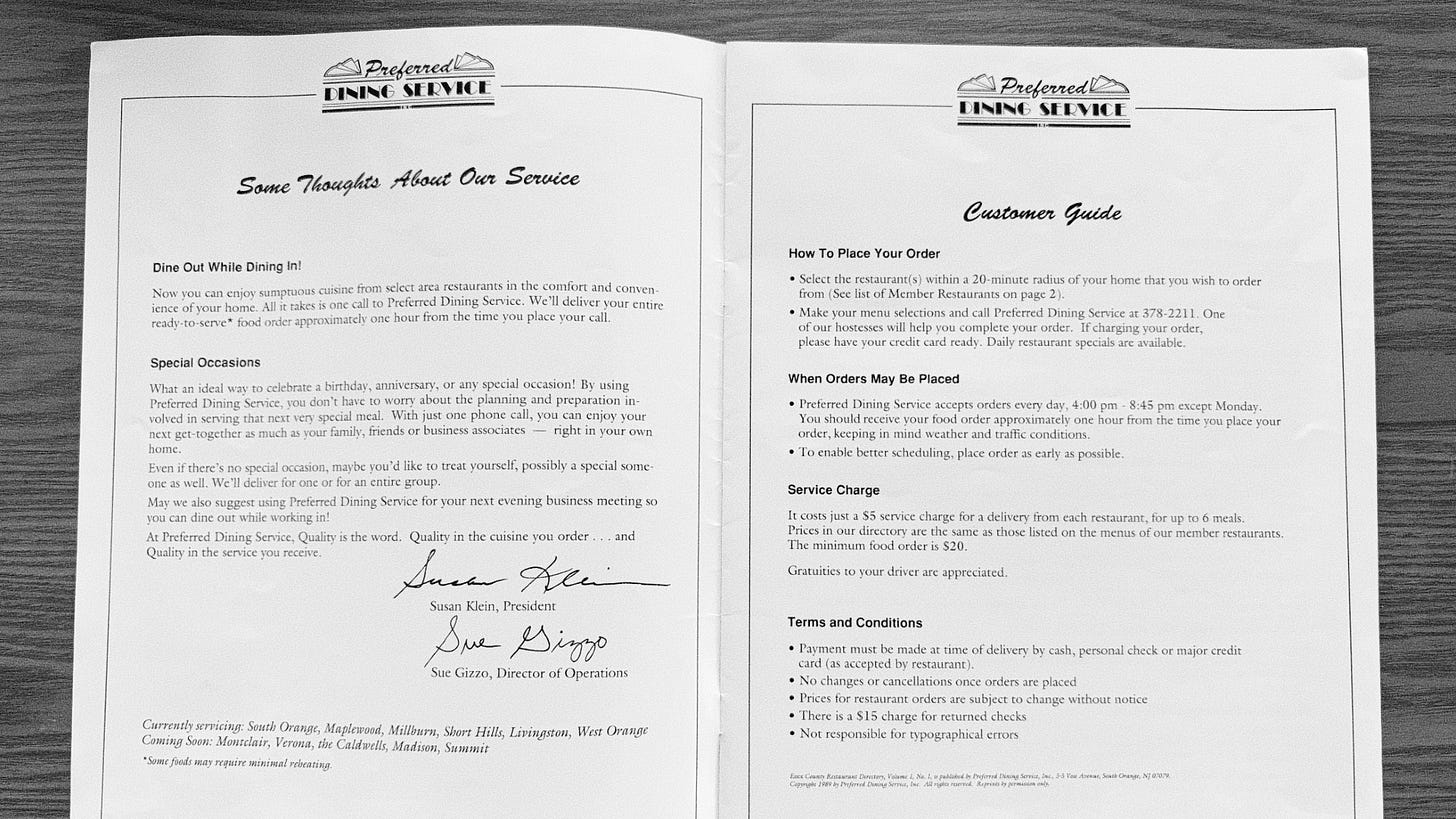
Rules of Reality
Preferred Dining vs. DoorDash reveals how reality operates:
1. Culture is written by each of us. Norms are whatever narratives win. Sometimes for better and sometimes for worse. But they’re our own making. Reality isn’t “truth” winning out. Culture just bends toward whoever shows up. This should empower and motivate us as much as terrify us.
2. You can just do things. You can just create food delivery. My grandma did. Your ideas are not enough, though. You literally have to roll up your sleeves, dig the dirt and seed your ideas. Put your preferred futures into the world. They’ll grow in ways you’d never expected. Commit. Toil. And sweat. Pollinate responsibly.
3. The Klein family isn’t worth billions because my grandma learned what DoorDash didn’t. Some ideas are not meant to scale so far and wide. $5.9B to validate an idea with exploitation still as an outcome maybe just isn’t a good idea. I don’t know. The unit economics are nightmarish, the logistics are exhausting, and somehow orders are still consistently late, wrong and cold. DoorDash didn’t spend billions to invent a new idea — food delivery already existed. They spent it on trying to make math work. Fun.
My grandma learned that reality is writable, but just because you can make reality and that ideas can scale, it doesn’t mean they always should. Thinking on a community-level rather than global one is sometimes necessary. There are harsh tradeoffs to scale: quality, dignity and ethics. This realization and lack of sacrifice, in my eyes, makes my grandma the real successful one here.
At the end of the day, you don’t need billions to make or positively influence culture, and spending that much to try to do so likely isn’t a great start.
Instead, you just need the awareness that you too can write any future you want.
Change anything.
Compromise nothing.


